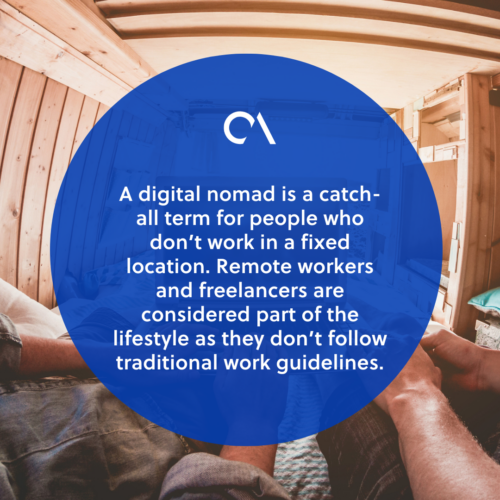How digital nomads are defying the traditional workplace

The digital nomadic lifestyle started when people got bored, fed up, and burnt out from working in the same space for days on end.
The nomadic movement inspired people to find jobs that allowed them to work whenever or wherever they wanted.
Upon seeing the trend, companies started to offer remote work and open their doors to international candidates, leading to new opportunities for everyone and ending in a win-win situation for both employers and employees.
This article discusses what it means to be a digital nomad and the pros and cons that come with it.
What is a digital nomad?
A digital nomad (digital nomadism) is a catch-all term for people who don’t work in a fixed location.
Remote workers and freelancers are considered part of the lifestyle as they don’t follow traditional work guidelines.
The digital nomad community introduces “true” work-life balance as it allows remote workers to be as free as they can be. These location-independent workers hold their own hours so they can work remotely and at their own pace.
They have the option of working from home, in coffee shops, or even in a foreign country, or pretty much anywhere that has a reliable internet connection.

3 tips to becoming a digital nomad
Embracing the nomadic lifestyle is easier said than done. Even with the countless opportunities for digital nomads, executing the plan still needs hard work.
Pioneers of the lifestyle have simplified the process with these top tips on how to become a digital nomad.
1. Hone your skills
Honing your skill set (and marketing them if you’re a freelancer) is an integral part of the digital nomad movement.
Like any other remote work opportunity out there, you need to let employers know that you are a valuable asset to their company.
Both soft skills and hard skills are important for ensuring that you can play the part when it comes to the job. Additionally, use this chance to acquire new skills which you can apply in the future.
2. Look for remote-only job opportunities
It goes without saying that remote-only job opportunities are the foundation of the movement. These allow digital nomad communities to sustain themselves and the lifestyle they want.
Furthermore, digital nomads travel to different locations, making remote work all the more important.
The best place to start is job platforms dedicated to remote-only jobs.
You can also look at established companies that allow you to work remotely full-time or — if you have that entrepreneurial spirit — start your dream business!
3. Plan your lifestyle
Contrary to popular belief, it requires a lot of careful planning to become a digital nomad, especially career-wise
Due to the exponential growth that industries experience on a daily basis, employees have to upgrade their skills to keep up with the trends and demands.
This includes acquiring health insurance, visa processes, and managing time zone differences if you are working in other countries.
Just because you’re experiencing working differently than others, it doesn’t mean you’re immune to becoming underemployed, exploited, and overworked.

Advantages and disadvantages of the digital nomad life
It would be too idealistic to say that the digital nomad life doesn’t have any disadvantages. It’s important to be aware of these potential drawbacks better to prepare you for the career and lifestyle change.
Here are the advantages and disadvantages to help you decide whether the digital nomad lifestyle is really for you.
Advantage #1: You hold your own hours
It seems like many digital nomads’ dream nowadays is to become their own boss, holding their own hours. This allows them to be more flexible at work while juggling personal responsibilities.
Advantage #2: You can work where you’re comfortable
Be it at the beach, in a campervan, or in your sweatpants in the comfort of your home. Being able to take your work anywhere is one of the greatest charms of being a digital nomad.
Advantage #3: No commuting is required
When digital nomads say “no commuting,” they mean commuting to the office. Since they work strictly using their laptops and other devices, they don’t need to go to an office to perform their work functions.
Advantage #4: New opportunities for personal and career growth
Personal and career growth are such important parts of a professional’s everyday life that changing work styles will affect them.
Most remote employees leave their office jobs because they feel stagnant. They often correlate this with the lack of opportunities for advancement in their professional and personal goals.
Advantage #5: Exposure to different cultures
Many digital nomads and like-minded people get to visit many countries. They gain diverse experiences from traveling around the world.
Disadvantage #1: It takes effort to start
Building a professional brand and honing skills on your own is hard work, but it does pay off well in the long run. One can’t expect to become part of the movement without putting in the effort.
Disadvantage #2: Discipline and self-motivation may dwindle
No matter how attractive this lifestyle sounds, most digital nomads tend to lose self-discipline and motivation.
This is especially true when they don’t have the monitoring and support system found in the traditional office setup.
Disadvantage #3: There’s no guaranteed income
Holding your own hours means that you’re responsible for your own income.
An “all or nothing” mindset is what plagues most remote workers and freelancers to this day. Freelancers tend to take on more projects, leading to sloppy work and early burnout.
Remember to have a backup plan ready in case you change your mind.
Disadvantage #4: The logistics can be a hassle
Remote work is no different from working in an office, so digital nomads still have to undergo a different process to secure their position.
This includes securing work visas and managing time zones. Sometimes, even finding a place with decent internet access can be a real setback.
Can the digital nomad lifestyle sustain industries?
While some industries heavily rely on onsite employees (e.g., retail, hospitality, or food service), there are certain subsectors that can be sustained by this lifestyle.
Tech-enabled jobs such as digital marketing, customer services, telesales, help desks, are just a few examples of jobs that can be done remotely. These can be sustained by the movement, given that employees are provided with the proper tools and equipment.
Embracing a nontraditional work concept opens up avenues for companies and employees to find a middle ground that cultivates a productive work environment.







 Independent
Independent




